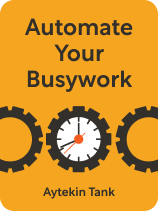

This article is an excerpt from the Shortform book guide to "Automate Your Busywork" by Aytekin Tank. Shortform has the world's best summaries and analyses of books you should be reading.
Like this article? Sign up for a free trial here.
Are manual tasks killing your productivity? Is there a way to handle routine work that will increase your efficiency?
Automation tools are transforming how we approach daily tasks and revolutionizing workplace efficiency. In his book Automate Your Busywork, Aytekin Tank reveals the hidden costs of manual busywork and explains how automation and productivity are closely connected.
Keep reading to discover how you can work smarter—not harder—and finally break free from the cycle of tedious manual tasks.
Automation and Productivity
In his book, Tank highlights the link between automation and productivity, especially when it comes to busywork. He explains the downsides of manually handling routine tasks, and he outline the benefits of automating such tasks. This information will help you recognize the value of automation and motivate you to take advantage of it in your work.
The Negative Effects of Manually Handling Routine Tasks
According to Tank, there’s no benefit to manually handling routine tasks. Rather, engaging in such tasks creates three negative effects that stifle efficiency, productivity, and job satisfaction:
- It fragments your attention.
- It creates a false sense of productivity.
- It leads to errors and bottlenecks.
Let’s explore each effect in more detail.
Negative Effect #1: It Fragments Your Attention
Handling routine tasks often requires frequent switching between different activities throughout the day. This is because such tasks tend to be quickly completed but numerous, leading to constant transitions between activities. For example, if you have to check and respond to emails throughout the day, you might switch between this task and other activities multiple times within an hour. Tank argues that this constant task switching wastes time and drains your mental energy, making it difficult to focus on complex problems or creative work. As a result, you’re more prone to frustration and burnout.
(Shortform note: Why does task switching lead to frustration and burnout? Brian Tracy (Eat That Frog!) explains that your brain can only focus on one thing at a time—and each time you switch your attention, it takes 17 minutes to totally focus on your new task. This means that the more you switch your attention between tasks, the more time and energy you waste trying—and failing—to achieve the intense focus that creative, complex work requires. As a result, you feel tired and busy, but you don’t make meaningful progress on your work.)
Negative Effect #2: It Creates a False Sense of Productivity
According to Tank, completing numerous small tasks creates an illusion of accomplishment that masks the fact that you’re neglecting more important work. You might feel productive each time you cross a routine item off your to-do list, but these small accomplishments rarely contribute to your long-term goals or career growth.
(Shortform note: Gary Keller (The One Thing) adds that task switching reduces your motivation to maintain focus on complicated tasks because it makes you feel good. He explains that you get a little jolt of dopamine (a pleasurable neurochemical) each time you shift attention toward a new task. This neurochemical reward system trains your brain to prioritize short and simple tasks over complex ones. In other words, the more often you experience the pleasure of task switching, the more difficult it becomes to focus on complex tasks or goals that don’t provide the same immediate gratification.)
Negative Effect #3: It Leads to Errors and Bottlenecks
Tank explains that the more routine tasks you take on, the more fragmented your focus becomes, making you prone to mistakes due to fatigue, distraction, or simple human oversight. These mistakes often require additional time and energy to correct, further reducing your productivity.
Additionally, if your workload grows, manually handling such tasks becomes increasingly unsustainable. This creates bottlenecks in your workflow, slowing down important processes and limiting your ability to take on new opportunities or focus on high-value work.
| Handling Routine Tasks Makes You Work Harder (Not Smarter) Atul Gawande (The Checklist Manifesto) echoes Tank’s concerns, suggesting that we’re prone to making mistakes on routine tasks due to memory lapses and distractions. Additionally, we tend to purposely skip steps we deem less critical because we learn that they don’t always impact outcomes—for example, we might skip file backups because data loss rarely occurs. This is particularly risky in “all-or-none processes,” where missing one key step can lead to complete failure—like forgetting to save a complex spreadsheet before closing it, resulting in complete data loss. Like Tank, Gawande also notes that as routine tasks accumulate, our ability to determine whether a task is critical diminishes. As a result, we’re more likely to prioritize immediate, unimportant demands over important, but less urgent, responsibilities. As Tank observes, this can create bottlenecks that undermine your overall efficiency. |
How Automation Boosts Productivity
Now that you understand the downsides of manually handling routine tasks, let’s explore how automating them can address these issues and improve your work life. According to Tank, leveraging automation tools creates five benefits that compound over time:
- It frees up time and mental energy.
- It increases accuracy.
- It achieves more.
- It offers data-driven insights.
- It improves job satisfaction.
Let’s explore each of these benefits in detail.
Benefit #1: It Frees Up Time and Mental Energy
Tank explains that delegating routine tasks to automated systems reduces your workload and decreases the need to switch between tasks. This results in fewer interruptions, enabling you to focus on complex problems or creative projects. (Shortform note: Daniel Levitin (The Organized Mind) explains that our brains have limited working memory capacity, which gets overloaded easily when we try to keep track of numerous tasks. By handling the mental burden of routine task management, automation acts as an external memory system that frees up cognitive resources and enhances focus.)
Benefit #2: It Increases Accuracy
According to Tank, automated systems perform routine tasks with greater precision and reliability than humans, reducing errors and the need for time-consuming corrections. (Shortform note: While automation can increase accuracy, Don Norman (The Design of Everyday Things), cautions that poorly designed systems can introduce errors. This occurs when automated processes are confusing, provide little feedback, or don’t work as users expect them to—for example, an email system that automatically archives messages without notifying users. Such design flaws lead to misunderstandings and misuse of the system.)
Benefit #3: It Achieves More
Automated systems can handle an increased volume of tasks without requiring proportional increases in time or effort. Tank adds that these systems can work around the clock, handling tasks even when you’re not actively working. (Shortform note: Does automation’s ability to achieve more have a positive or negative impact on employment? This has been widely debated by economists, technology experts, and forecasters. Proponents argue that automation enables companies to grow faster, which creates more jobs for those who can perform creative and strategic tasks that machines can’t replicate. On the other hand, critics warn that automation’s capacity to operate 24/7 will cause unemployment, especially for those whose work consists entirely of replicable tasks.)
Benefit #4: It Offers Data-Driven Insights
Tanks says that many automation tools provide analytics that can help you identify patterns, bottlenecks, and further opportunities for optimizing your work processes. (Shortform note: Automation experts clarify that these analytics don’t just offer a retrospective view of data. Rather, their capacity to assimilate both historical and real-time data enables them to predict future trends, identify anomalies, and flag areas needing intervention. As a result, they provide analytics that aren’t just reactive, but proactively guide process optimization.)
Benefit #5: It Improves Job Satisfaction
Eliminating tedious tasks allows you to focus on the aspects of your job that you find more meaningful and engaging. According to Tank, this naturally enhances your ability to come up with innovative ideas and approaches in your work. (Shortform note: Cal Newport (Deep Work) clarifies how creating time to focus on meaningful tasks increases innovation and leads to greater satisfaction. Deeply focusing on challenging or important tasks engages higher cognitive functions like analysis, synthesis, and ideation. This kind of work is inherently rewarding because it helps you solve your most complex problems—the kind that, according to Newport, yield the greatest breakthroughs and satisfaction when solved.)

———End of Preview———
Like what you just read? Read the rest of the world's best book summary and analysis of Aytekin Tank's "Automate Your Busywork" at Shortform.
Here's what you'll find in our full Automate Your Busywork summary:
- How to use automation tools to free up space
- The negative effects of manually doing boring tasks
- How to choose the automation tool that’s right for you






